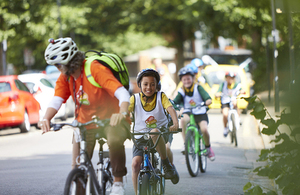
- further £13 million invested by government in Bikeability cycle programme to help children become confident cyclists
- investment comes as cycle training scheme celebrates teaching 3 million youngsters bike safety skills
- the government's long-term ambition is for cycling and walking to become the natural choices for shorter journeys, or as part of longer journeys
More schoolchildren across England will now learn essential cycling skills thanks to a £13 million government investment in Bikeability, following a record year for the cycle training programme.
Bikeability training is offered at 3 levels based on a child's age and experience. Training starts with basic bike-handling skills in a traffic-free, controlled environment and builds to managing a variety of traffic conditions on different types of roads.
Around 400,000 children had completed the scheme in the year up to April 2019 while the total number trained since Bikeability was launched in 2006 has now reached 3 million.
The funding, announced today (11 October 2019) by Transport Secretary Grant Shapps during a visit to St. Philip Howard Catholic Primary School in Hatfield, will ensure the programme is able to continue for another year. This means approximately 50% of primary schools across England will be able to access the programme.
Children that cycle regularly are more likely to become active adults that are confident and safe cyclists.
Grant Shapps, Secretary of State for Transport, said:
Cycling and walking are great forms of exercise, helping to reduce child obesity, and boosting people's physical and mental health.
I am delighted to see Bikeability has now supported 3 million children to take to their bikes safely and confidently, kick-starting a lifetime of cycling for them.
I hope that the £13 million investment announced today will help them continue to train millions more young cyclists over the coming years.
Gavin Williamson, Secretary of State for Education, said:
The benefits of cycling to school go far beyond providing an active and fun way for children to get to school. Cycling cuts carbon emissions and traffic levels outside of schools by taking cars off the road.
The government's Bikeability scheme gives young people the knowledge and confidence they need to cycle safely, providing peace of mind to parents, pupils and schools and I'm so pleased that we're able to invest this new money in the programme - it's an investment in our future.
Jo Churchill, Public Health Minister, said:
The extension of this scheme is a vital step in encouraging more children to be active. Physical activity has so many health benefits for our children - it keeps them fit and healthy, strengthens muscles and bones, increases self-esteem, and improves concentration and learning in school.
As part of our prevention green paper, we set out our ambition to promote more active travel. Building activity into the school run is one of the many ways to do this and the Bikeability scheme will help more children stay active every day. What's more, it's fun!
Paul Robison, Chief Executive Officer of the Bikeability Trust, said:
We are delighted that funding for Bikeability in 2020/21 has been confirmed. High-quality cycle training enables confident and enjoyable cycling, raises awareness of skilful cycling among all road users and contributes to better transport, health and wellbeing.
Children love Bikeability and parents value the training their children receive. Independent research confirms Bikeability helps children cycle more safely, more often.
Dr. Karen Exley, Group Leader of Air Pollution at Public Health England, said:
Cycling is a great way of cutting congestion by encouraging people to get out of their cars on short journeys such as the school run.
It will help to reduce idling outside schools, which will improve air quality where children congregate and increase the amount of exercise young people take.
The government has also recently provided £20 million to create traffic free cycling and walking routes and improved signage, road crossings and accessibility for mobility scooters, wheelchairs and adapted bikes as part of a programme of upgrades for the National Cycle Network. Over £7 million has also been made available to local authorities to improve cycle safety at dangerous junctions.
These improvements are part of the Cycling and Walking Investment Strategy which outlines a range of government actions to double cycling and increase walking by 2025.
The government's long-term ambition is for cycling and walking to become the natural choices for shorter journeys, or as part of longer journeys. Almost £2 billion is projected to be invested in active travel between 2016 to 2017 and 2020 to 2021. This is a three-fold increase in investment per head since 2010.






